Dalaam’s Name
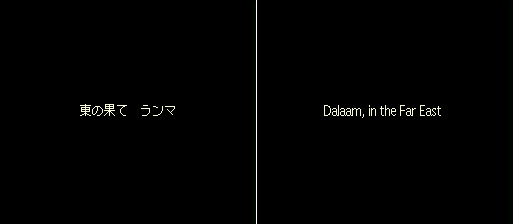 |
In MOTHER 2, the kingdom where Poo lives is called Ranma. In EarthBound, it was changed to Dalaam. Why they changed it I can’t say, people just liked it better that way.
Because of how Japanese works, “Ranma” can also be spelled out and pronounced as “Ramma” if one so desires. In fact, that spelling is used in the MOTHER 2 instruction booklet.
Meaning of Mu
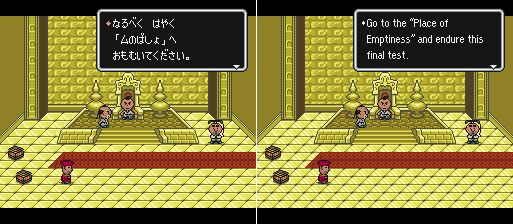 |
There’s some inconsistent translating here in the Dalaam segment, likely because the lines are stored all over the script in random places. First, it’s important to note that “mu” translates to something like “nothing” or “emptiness” or “not existing”. You can read more about the concept here.
Now, when Poo’s master first speaks in MOTHER 2, he says what translates to, “Go to the Place of Mu.” In EarthBound’s translation, it’s translated as “Go to the ‘Place of Emptiness’.”
Which is okay, if they decide to translate “Mu” as “Emptiness” from then on. They don’t though, plus they even change their translation for it the next time it’s mentioned:
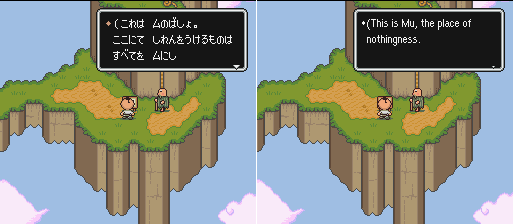 |
Here, when it’s mentioned again on the sign in front of the place you’re supposed to go to, it’s now called, “Mu, the place of nothingness.” This also makes it sound like “Mu” is the name of a location, when it isn’t like that at all.
And then, if you mess up and go talk to the master again, he simply calls the place “Mu” now:
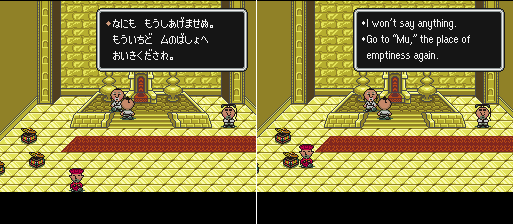 |
I remember thinking this stuff seemed odd somehow when I first played EarthBound, so I guess this is the reason why. Ideally, they would have used “Mu” in a standardized way, and given a standardized name for the training area as well. “Place of Mu” is an awkward translation though, so maybe something a little less literal like, “Mu Training Grounds” or “Mu Trial Spot” might have worked.
Poo’s Master’s Name
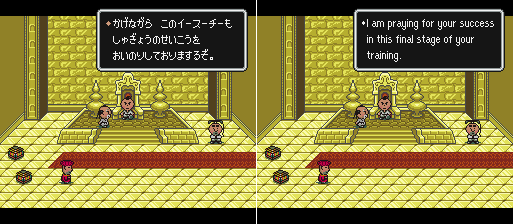 |
In EarthBound, Poo’s master isn’t really given a name. He’s just called “Poo’s Master” in the cast of characters roll at the end of the game.
In MOTHER 2, though, he DOES have a name. It’s a Chinese name which, in pinyin, would be written something like “Yi-Si-Qi”. Pronounced in Japanese, it’s something like “Ee-soo-chee”, but I’ve forgotten most of my Chinese studies so I can’t confidently say how it would be pronounced in actual Chinese.
His name means “One-four-seven” and is a Mahjong reference. Mahjong is crazy complicated and I don’t know anything about it, but luckily a very helpful fan sent this in:
MahJong, as you may know, is a sort of cross between poker and Gin Rummy, in that you draw a tile, discard a tile, and try to build a hand for points and money. Each player has 13 tiles at any given time, and must make a hand with 14 tiles (including a drawn tile, or in the case of someone very unlucky, their discarded tile that you steal) consisting of 4 “Sets of Three” and a pair. The set of three can either be three of a kind (within the same suit, of course. There’s 4 of each tile after all), or a sequence of 3 numbers of one suit in a row. So a 1-2-3 of the Pin tiles would be considered one “set of three”. It MUST be a sequence of three, by the way. 1-2-3-4 would be unacceptable.
Now, in Japanese Mahjong, when you discard a tile, you put it into a nice organized pile in front of you, so each player knows who discarded what tile, and at what moment (in Chinese rules, you can discard it where ever, so remembering who played what from 136/144 tiles and when is something of a “Chessmaster” in their games). One of the advanced techniques that gamblers and pros use is reading the discard tiles to tell which tile is a bad play or a good one. This is where the number 1-4-7 is very important.
1-4-7 is an important number in both hand building, and in discard reading. When you have a 1-4-7 of the same suit in your hand, you can build a sequence run on any of those numbers just by building next to it, and discarding the others as you go. For instance, if I had a 1-4-7 in my hand, and I drew a 3, then that means I’d have 1-3-4-7 in my hand. The 3 is close to completing a run because if I get a 2, I get a 1-2-3, or if I get a 5, I can build a 3-4-5 run, completing it as I go. So in this case, I discard the 7 and wait for a 2 or a 5 tile. Which is the ideal move to do. Instances where I get a duplicate, like say another 7, I simply keep that in my hand and hope I can get another 7 for a Three of a Kind set.
You can also accomplish the same thing with the tiles of 2-5-8 and 3-6-9.
Now, Mahjong is a luck based game, so it’s actually uncommon that your hand works out so perfectly like this. The other more important aspect of the 1-4-7 rule is the discard reading. If I see an opponent discard a 7 early in the game, then logic dictates that he had no tiles around that 7, so the 6, 8, and 9 tiles are out. The two other tiles that are closer to that are the 1-4 tile structure. If he had a 5 tile, he wouldn’t have discarded the 7 because a 6 could have come along and completed a run of 5-6-7. So, the rule of 1-4-7 states that it’s more likely that he just drew a tile that was around the 1-4 range, and is waiting for one more tile to complete this.
Thanks to this, I know playing a 2, 3, or 5 would be incredibly dangerous, as if the player wins off of my stolen discarded tile, I would have to pay the entire amount of the value of the hand to that player. And by proxy, 1 and 4 are also likely dangerous. So if I see someone discard a 7 and suspected them of winning soon, I would only play tiles 6 through 9.
So it’s a method of telling who has what and whether you should avoid playing certain tiles or not. Of course, it’s not 100% effective, or even 70% effective. There are many situations where a player might have a 1-3-4-4 in their hand, discard the 4 and the 1 so that they’re waiting on a 2 and 5, and trick me into thinking that because of the 1 and 4 discards, it’s safe to discard my 2 tile. It’s largely luck based, so you have to be careful about reading, especially later in the round when hands are getting closer to completion and odd discards like that happen more frequently.
tl;dr: 1-4-7 is an important hand building and tile-discard reading concept used by advanced players to tell what other players may or may not have.
Philosophical Reference
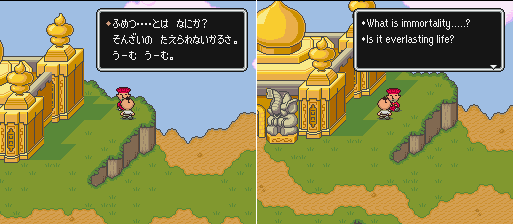 |
In EarthBound, this guy says, “What is immortality…..? Is it everlasting life?”
In MOTHER 2, he says, “What is immortality…? Is it the unbearable lightness of being? Hmm…”
On the surface, it’s not all that different, but the MOTHER 2 line is actually a reference to a well-known philosophical novel titled, “The Unbearable Lightness of Being”.
The original line just sounds much more philosophical and deep too. Either the translators weren’t aware of the book or the English editor with no knowlege of Japanese thought it sounded a bit odd and tried to smooth it out into more natural-sounding language.
Preet Poot Man
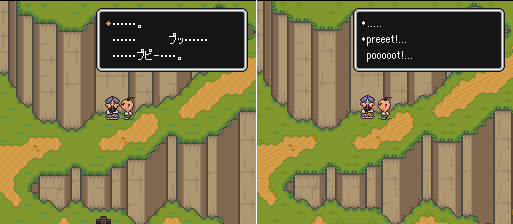 |
There’s a guy in Dalaam who says, “preeet! pooooot!” He’s a beloved character, and fans will be happy to know he’s just as flatulent in MOTHER 2. As strange as it sounds, I think this line was conveyed quite well in English. It’s always hard to translate onomatopoeia across languages.
Popular Prince Poo
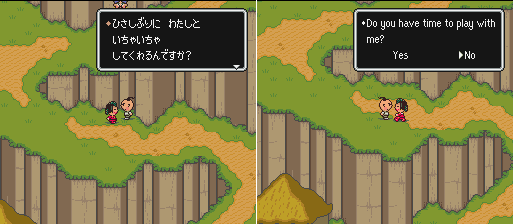 |
All the girls in Dalaam are head over heels for Poo. This particular girl says, “Do you have time to play with me?” after which you can say yes or no.
In MOTHER 2, though, what she says roughly translates to, “Will you be lovey-dovey with me/make out with me again like you used to?” It could be that she’s just teasing him, hoping to get him to say yes. Or maybe she’s telling the truth. It’s up to you to decide.
If you say yes, she’ll say, “I’m so happy! (*lovey-dovey*)” in MOTHER 2. If you say no, she’ll say, “Aww, it’s because you have training, huh? I hate your training!”
In EarthBound, if you say yes, she’ll say, “Happy me! (patty cake, patty cake…)” If you say no, she’ll say, “Hah, I knew it. ‘Training’ changed you! I’m jealous of your training!”
Moo Training
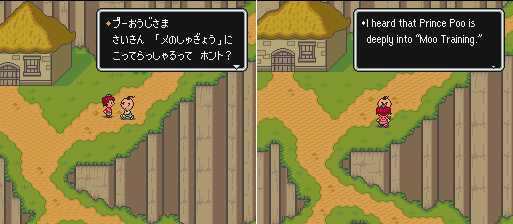 |
In MOTHER 2, this girl mistakes the word “mu” for the word “me”. “Me” means eye, so she says, “Is it true that Prince Poo has been obsessed with ‘eye training’ lately?”
Mistaking “mu” for “me” would make no sense in English, so for the localization they changed the line to, “I heard that Prince Poo is deeply into ‘Moo Training’. …I want to help him, if I can.”
Later, what she says changes. In MOTHER 2, she says, “I wonder if Prince Poo’s ‘eye training’ went well. I was hoping he would gaze at me with his improved eyes.”
In EarthBound, she says, “I wonder if Prince Poo succeeded in ‘Moo Training’? I wanted him to come by and show me his best barnyard impression.”
I really like the EarthBound lines a lot more. The joke is more understandable and the wordplay makes things even more “out-there”.
Untranslatable Japanese Humor
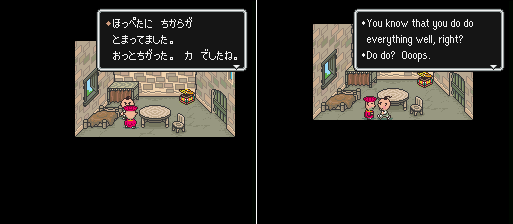 |
This guy in Dalaam has a really neat line in Japanese that’s not possible to translate into English without adding a ton of extra notes which of course kills the joke entirely. Basically, the joke is that he mixes up the kana character “ka” (カ) with kanji character “chikara” (力). They might look the same, but they’re not. Welcome to Japanese!
Honestly, I don’t think any other RPG before MOTHER 2 had text like this, it’s really unique. It’s probably really rare in RPGs AFTER this one too. What’s funny is that this is the second such line in the game so far, so this isn’t a one-time deal.
Anyway, in EarthBound, they had to pretty much come up with something completely new. It turned out to be, “You know that you do do everything well, right? Do do? Ooops.”
It’s difficult to explain, but this is a brilliant attempt at trying to mimic the intent of the original line. Never in a million years would I have come up with this. Plus, it fits well with having a prince named Poo and the farting guy outside. A big thumbs-up from me! I actually remember laughing out loud at this line the first time I played EarthBound.
Stoic Poo
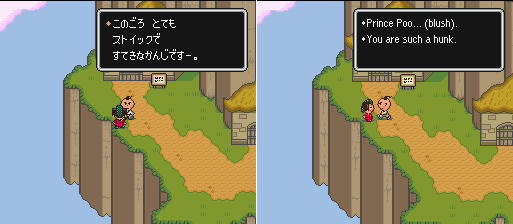 |
This girl in MOTHER 2 says, “Prince Poo… (blush) Lately, you seem really stoic and handsome!”
In EarthBound, she says, “Prince Poo… (blush). You are such a hunk.”
The use of the English word “stoic” here makes me wonder if it’s meant to be a loose connection to what just happened in the game with Ness and friends. Like, maybe eating magic cake from the Stoic Club lady is what made Ness dream of stoic Poo? I dunno. Itoi’s always very careful with his words, but it could just be coincidence.
Black Bunny Statues
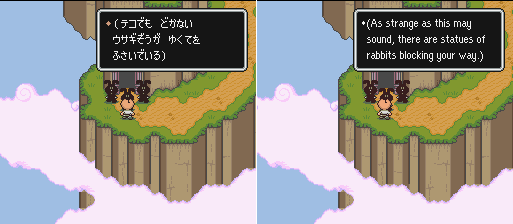 |
It’s hardly worth noting, but the EarthBound line adds in the part, “As strange as this may sound…” part here. The original text doesn’t have it. I think the localizers wanted to make all “weird statues blocking the way” seem standardized by adding that line in all instances, even if the original text didn’t have it.
Star Master Speaks
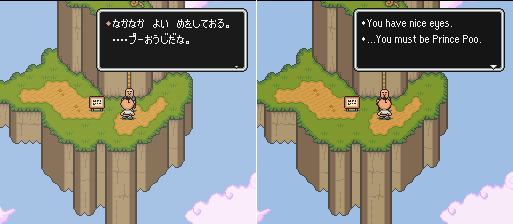 |
The so-called “Star Master” greets Poo as he reaches the “Place of Mu”. In EarthBound, he says, “You have nice eyes. …You must be Prince Poo.”
The thing is, that phrase CAN be translated as “nice eyes”, but in a context like this it usually means something more like “sharp eyes”, “strong eyes”, or anything along those lines. Basically, the fact that the look he gives off has strength behind it.
He also talks in an older, more formal manner, like what you’d expect from an old master. So it’s more like, “You have quite strong eyes, indeed. You must be Prince Poo.” or “You have a strong look in your eyes. You must be Prince Poo.” Just anything like that.
Ancestral Spirit
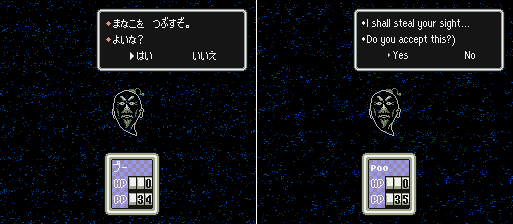 |
Poo’s ancestor shows up during Mu training and starts stealing body parts left and right. When it comes to take Poo’s eyes, in MOTHER 2, he says, “I will now crush your eyeballs. Do you accept this?”
In EarthBound, this is lightened up to simply say, “I shall steal your sight. Do you accept this?”
Heaven Becomes Eternity
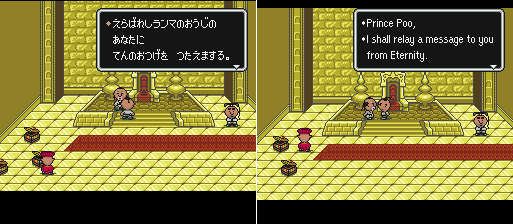 |
After Poo completes his Mu training, his master gives him a long informative speech. One part of it was changed slightly due to religious stuff.
In MOTHER 2, he says, “I will now relay the revelations of the heavens to you, the prince of Ranma and one of the chosen ones.” The word “heavens” could be replaced with “Heaven” if you wanted.
Since the EarthBound localizers tried to scrub out all religious references, this line was changed to, “Prince Poo, I shall relay a message to you from Eternity.”
Holy is Now Okay
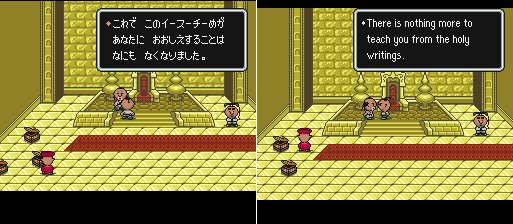 |
In MOTHER 2, the master says, “I, Yi-Si-Qi, have nothing left to teach you.”
In EarthBound, he says, “There is nothing more to teach you from the holy writings.”
It’s strange that the localizers added this “holy writings” part in. Even if it isn’t an especially religious reference, it still seems odd that they’d go out of their way to make that up out of nowhere and add it in.
Praying is Now Okay
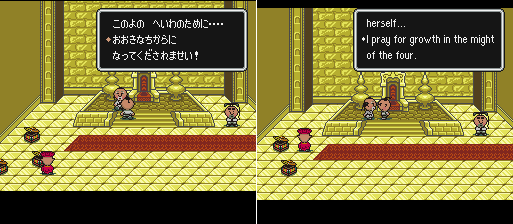 |
As the master finishes his speech, he says in EarthBound, “For all beings, for the earth herself… I pray for growth in the might of the four.”
In MOTHER 2, he says something like, “For the countless people out there… For the peace of the world… May you become a powerful force!”
The differences are minor – I’m mostly intrigued by the choice to add the word “pray” to his line.
- At last, an answer to why “Ramma” was renamed “Dalaam”, as explained by the localization director himself
- An example of “Ramma” still existing in EarthBound materials
- A different look at the term “Mu” and its multiple translations in EarthBound
- A quick note on Japanese puns in translation
- A clearer explanation of the “do do” guy’s Japanese text
- More on the “preet poot” guy
- Further details and info on the references made in the MOTHER 2 version of the philosopher’s dialogue
- More info – with photos and scans – on the Japanese name of Poo’s master
- Similar info on the Japanese name of EarthBound’s “Star Master”, and how this name connects with the name of Poo’s master
- A note on the violent meditation scene
- A brief summary of the tale that Poo’s meditation scene was partly inspired by


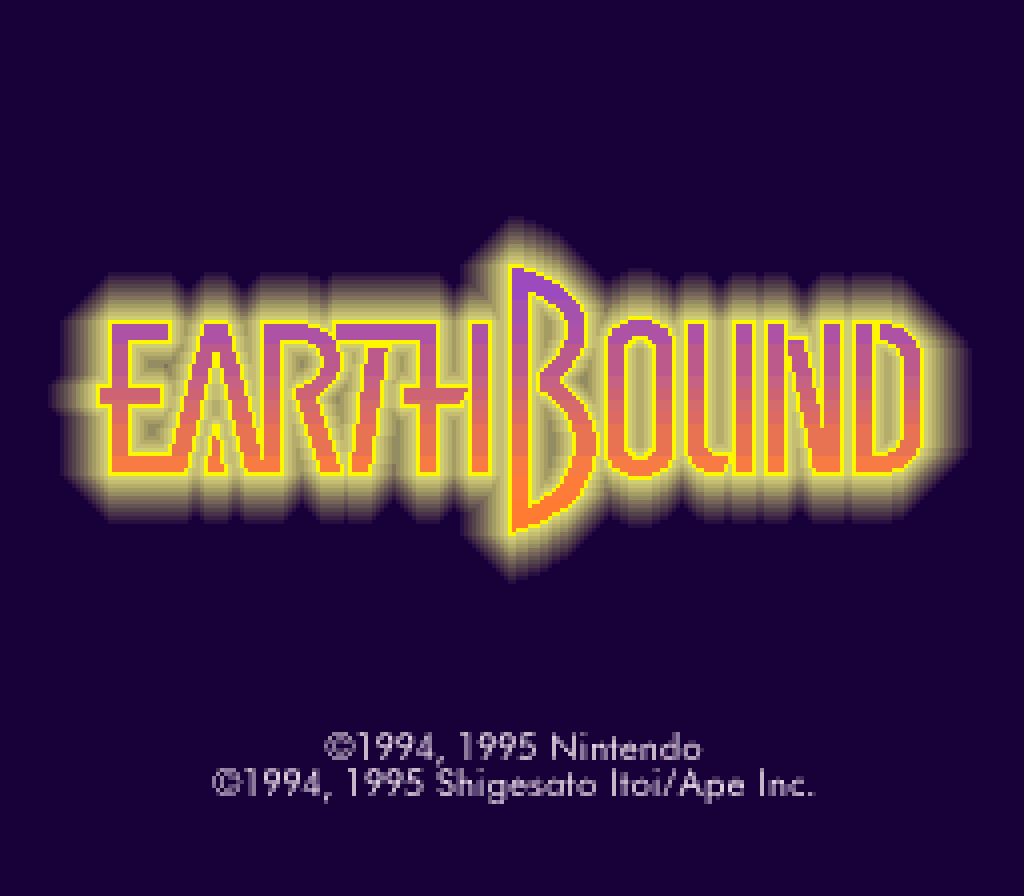
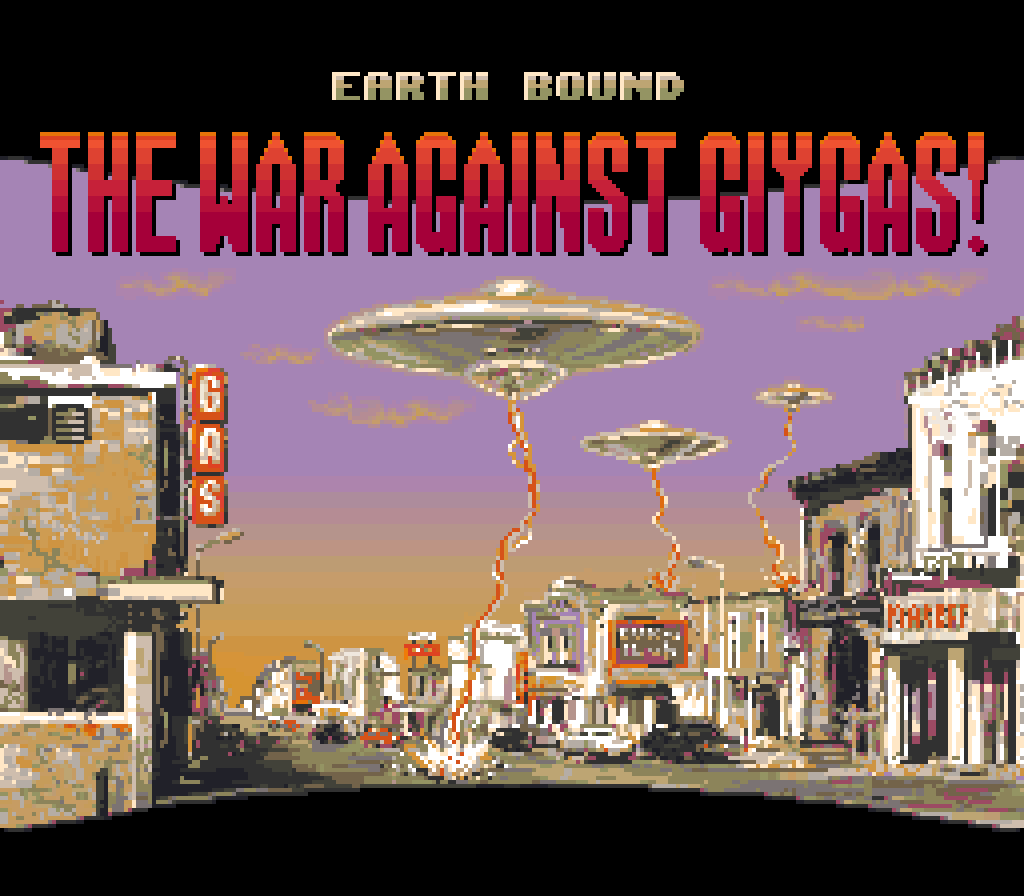
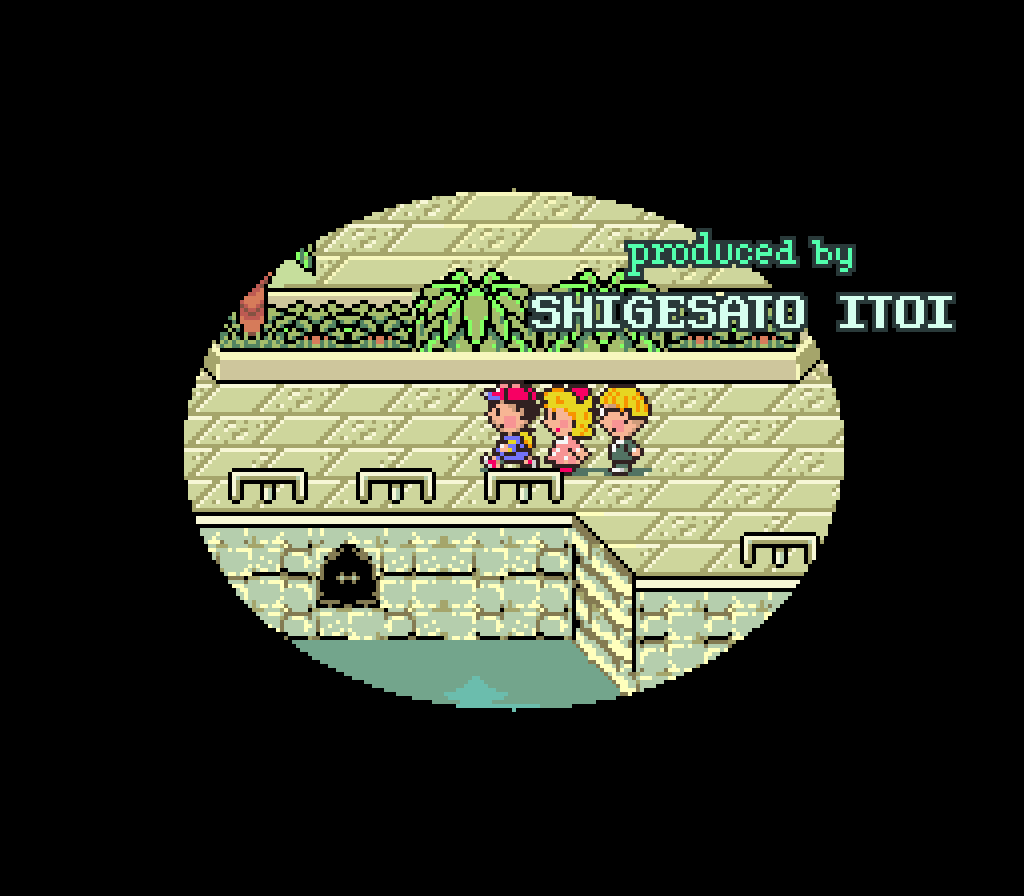
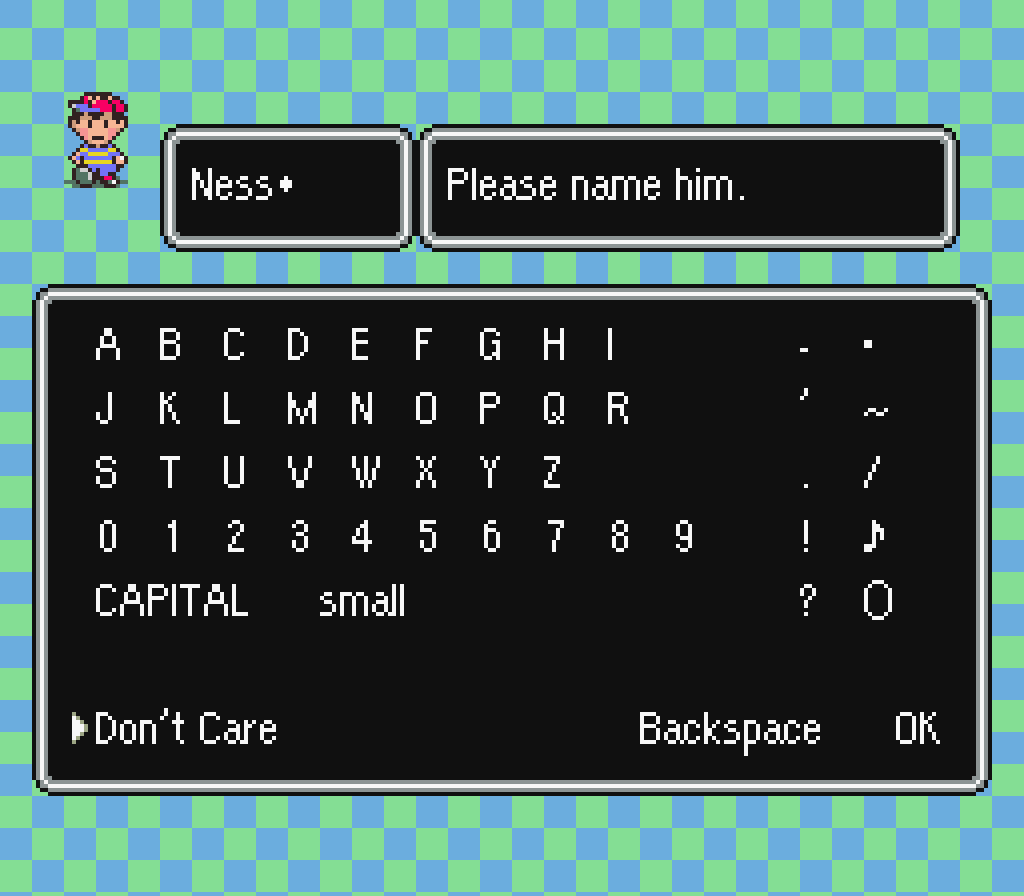
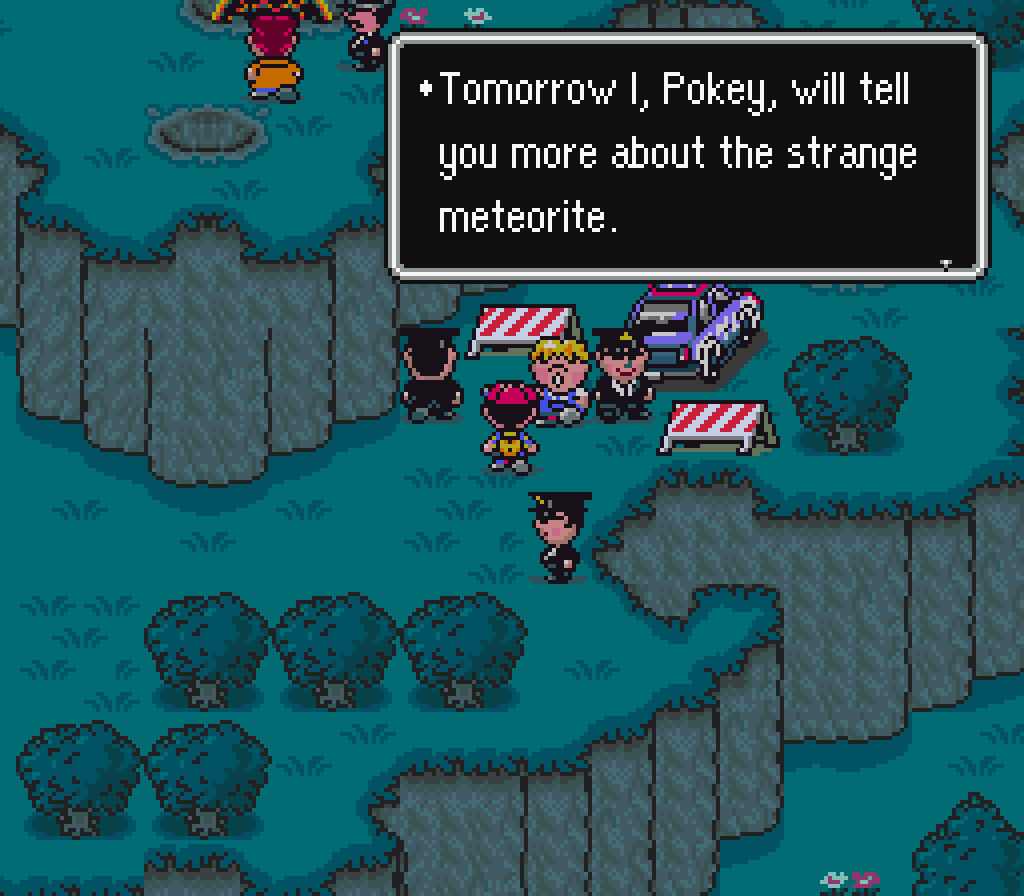
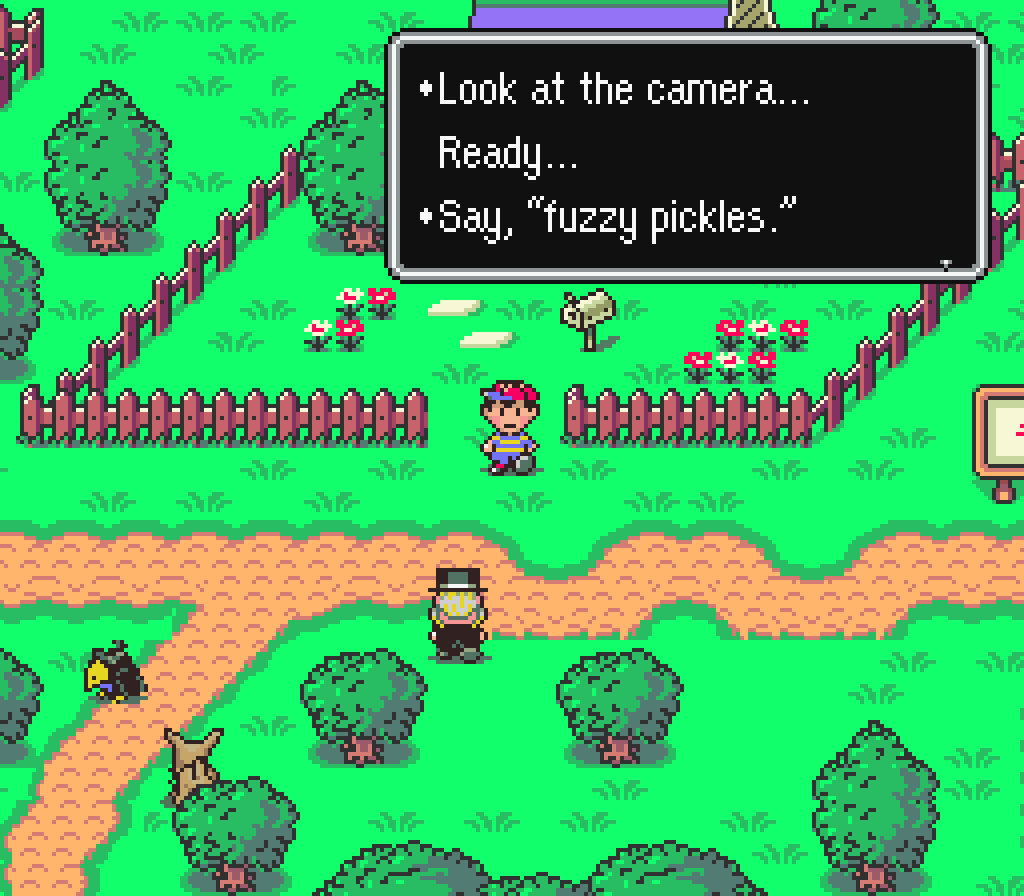
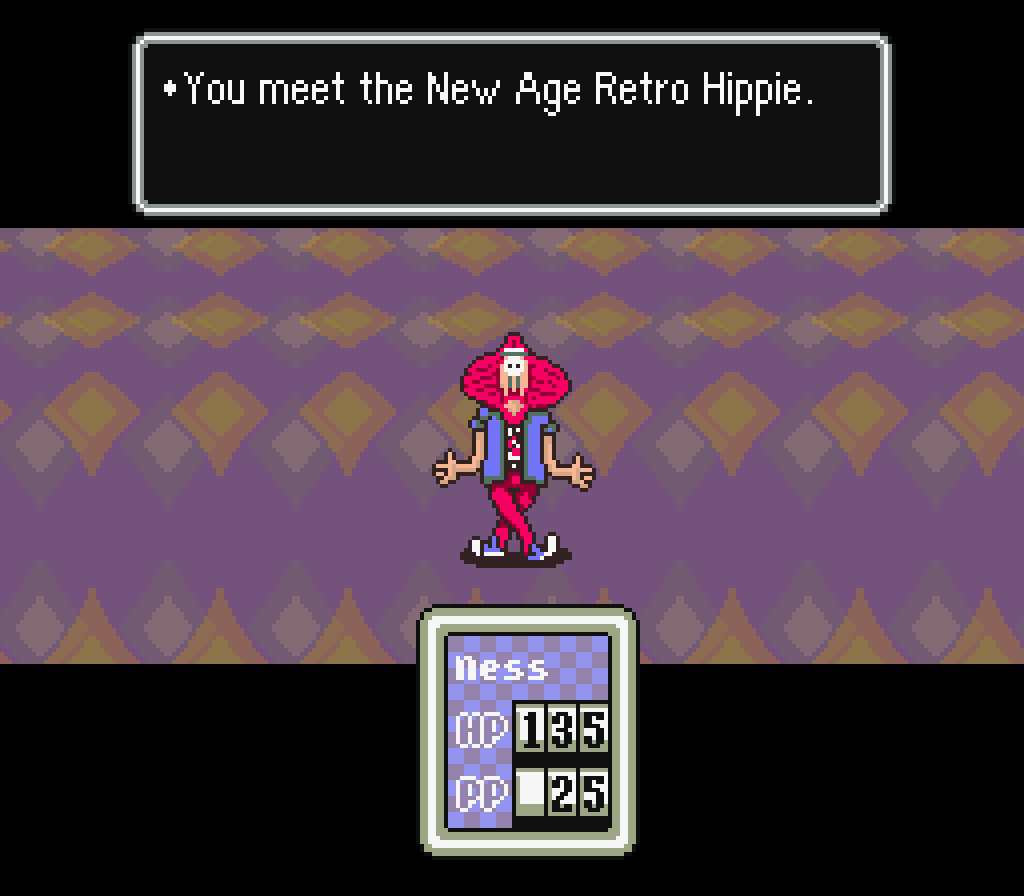
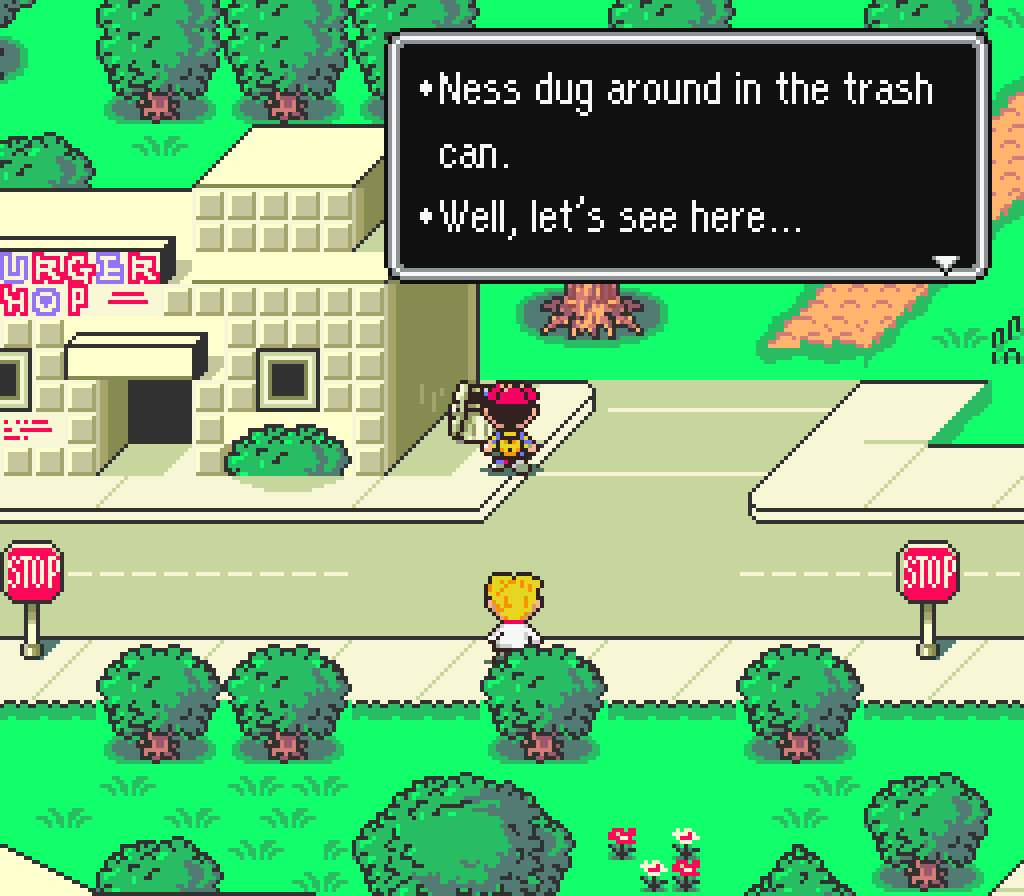
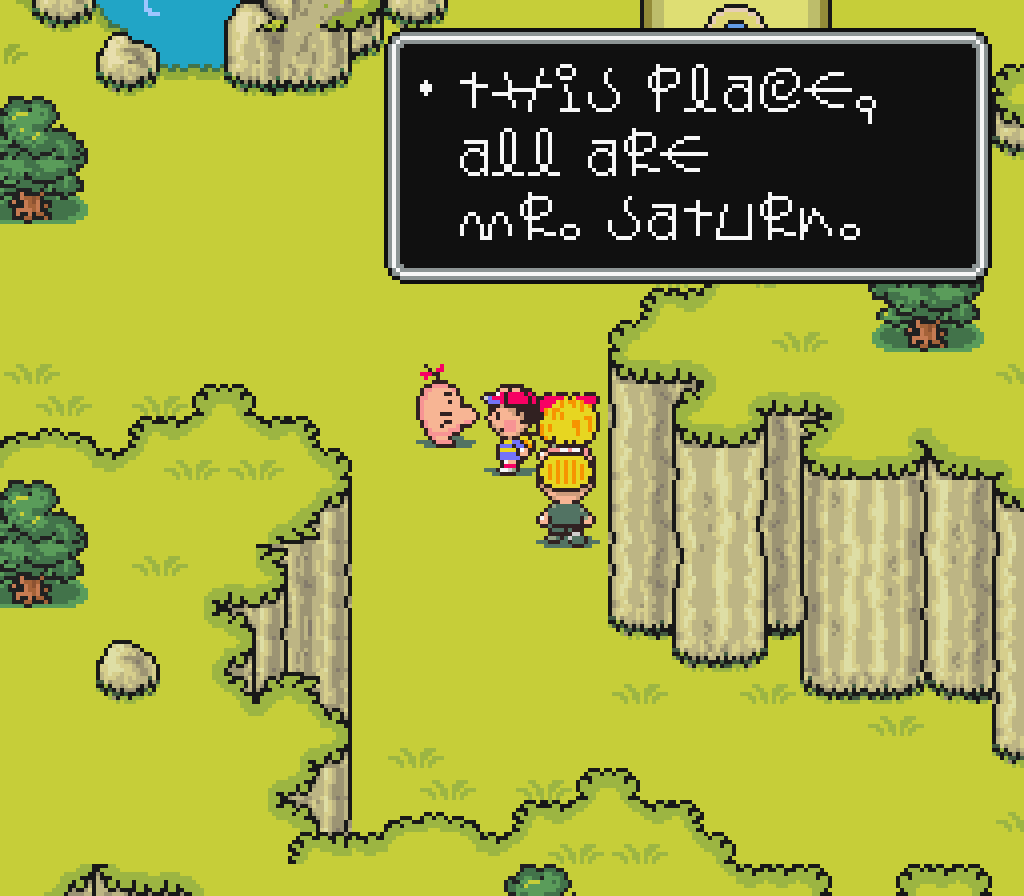
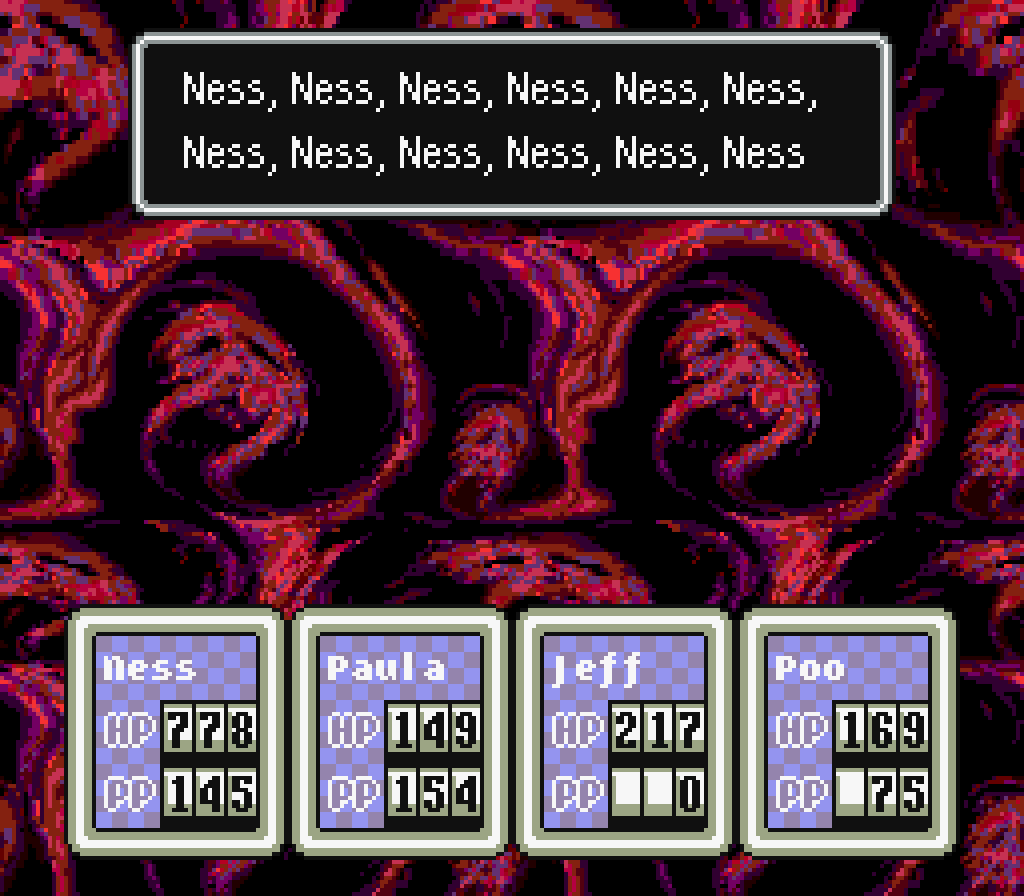
![Passport to MOTHER 2 [Learn Japanese!] Passport to MOTHER 2 [Learn Japanese!]](https://legendsoflocalization.com/wp-content/uploads/2018/05/pp-m2.jpg)
No Comments